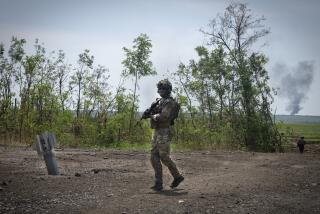At the Outset, a Strong Showing : After initial coalition triumphs, reasons for caution remain
- Share via
Filtering through the fog of battle that envelops Kuwait and the veil of operational secrecy imposed in Riyadh and Washington is an unmistakable sense of achievement and mood of optimism.
The land war to liberate Kuwait appears to have begun precisely the way American planners had promised it would. It has been massive in the numbers of troops committed, swift in execution, overwhelming in intensity. For five weeks American briefers had daily summed up the course of conflict with the prosaic assurance that everything was going according to schedule. On Sunday, barely 12 hours into the ground battle, officials abandoned their customary caution to report that allied progress on the ground was exceeding all expectations, that casualties were extraordinarily light, that the first day’s objectives had been achieved in half the time allotted. Before the battle began some military leaders forecast that it could be over in two weeks. Now some are speculating that the end could come in a matter of days.
For the most part, Iraqi forces positioned on the front lines in southern and western Kuwait appear to have been left with little stomach for battle after weeks of relentless allied bombardment. Witness Secretary of Defense Dick Cheney’s comment Sunday morning that the biggest immediate problem facing the coalition was processing the great number of prisoners it was taking. But the best of Saddam Hussein’s army, the supposedly highly motivated and well-equipped Republican Guard divisions, is farther to the north, and the extent to which those units have been engaged remains unclear at this writing. Until it’s evident that the Republican Guard has been neutralized as a battlefield threat, and until it’s clear that bloody street-to-street fighting in Kuwait City can be avoided, the danger to allied forces will remain, and anticipation of a quick and low-cost victory must be held in check.
Quite soon the world will get a firsthand look at Kuwait as it emerges from more than six months of Iraqi subjugation. The stories and pictures are expected to be grim. Even in the final hours of their occupation Iraqi forces were reported to be heaping atrocity upon atrocity, murdering Kuwaitis, stealing what had not earlier been looted, wantonly destroying oil installations and buildings. These are war crimes by any definition. If Kuwait presses for the reparations that U.N. resolutions and international law allow it to claim, Iraq faces years of enormous compensation payments.
Meanwhile, the war moves on toward its inexorable outcome, with the initial signs indicating that what may well be shaping up in Kuwait and southern Iraq is a formidable feat of allied arms. Americans can be proud of their armed forces in this conflict, and grateful that the unfolding victory is coming with such apparent speed.
More to Read
Sign up for Essential California
The most important California stories and recommendations in your inbox every morning.
You may occasionally receive promotional content from the Los Angeles Times.













